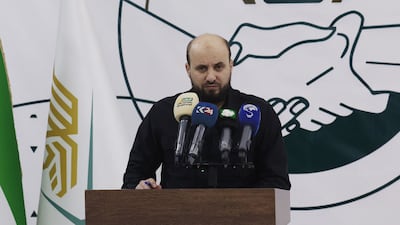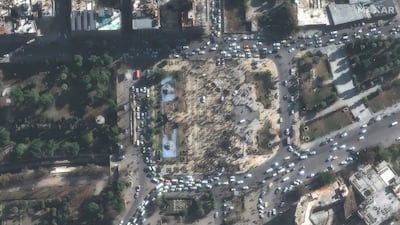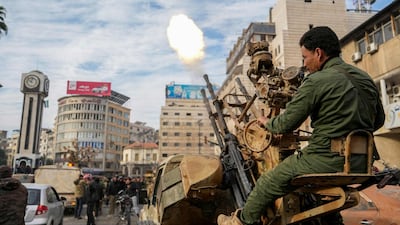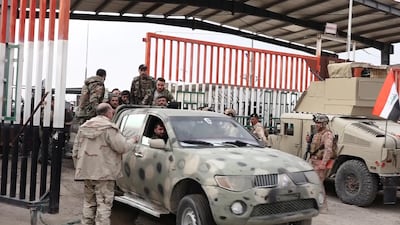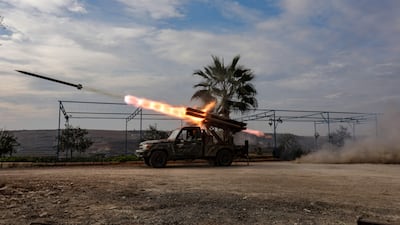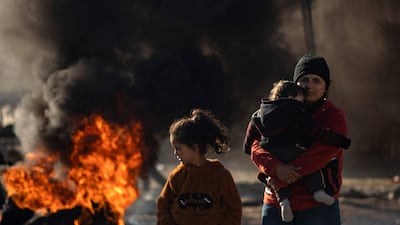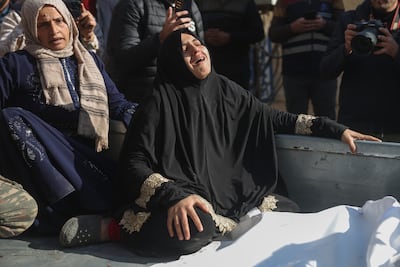In the space of a week, anti-government Syrian rebels have swept through north and western Syria, facing little resistance from forces loyal to President Bashar Al Assad.
In a multipronged operation, a coalition of rebels led by Hayat Tahrir Al Sham, a former Al Qaeda affiliate, have taken the key city of Aleppo, Syria’s industrial heart. They are now approaching the north of Hama, another strategic and significant urban centre on the motorway between the capital Damascus and Aleppo. Rebels directly backed by Turkey, known as the Syrian National Army, have pushed east and retaken areas previously held by Kurdish militias.
They launched the operations, Syrian opposition officials told The National, after the past year saw political negotiations between Syria, Turkey, and Damascus allies Russia and Iran reached a dead end, and Assad forces resumed bombing campaigns on rebel-held areas.
The offensive is the biggest challenge to Mr Al Assad since the 2011 uprisings against his rule, which were met with brutal crackdowns and eventually spiralled into civil war. His forces, in the past propped up and sustained by a panoply of Iran-backed militant groups from Lebanon, Iraq, Afghanistan and Pakistan, melted away over the past week, unable or unwilling to put up a fight.
Key questions remain about what happens next. In less than a week, rebels have doubled territory under their control, according to Charles Lister, head of the Syria programme at the Washington DC-based Middle East Institute. One key factor to follow will be their ability to govern and provide services in the areas they have taken.
Opposition forces have previously shown their ability to set up governance structures in areas under their control, by working with international humanitarian agencies and carrying out trade across the border with Turkey.
Their capacity also depends on the multitude of rebel groups maintaining some sort of cohesion and not turning against each other. Tension has risen between the so-called Syrian National Army, a coalition of Turkish-backed groups, and Hayat Tahrir, also known as HTS, over control of certain key areas they have taken from Assad forces, and to date it remains unclear how they will divvy up territory between them.
Aymen Al Asmi, spokesman for the Syrian opposition delegation at political talks over Syria in the Kazakh capital Astana, said that low-level tension was to be expected, and the opposition’s overall ability to govern should not be measured on some infighting between military factions. Their ability to minimise internal fractures depends on support from the international community, he said.
“The military guys are always more stubborn. The only guarantee is support to the political entities by the international community – the EU, the UK, the USA – to support the opposition so they can control these areas – materially and politically,” he told The National. “The only solution now is to strengthen the political bodies, so that the military bodies are subject to them, and not the opposite.”
But limited resources and the fact that Hayat Tahrir is designated as a US-designated terrorist organisation may hamper their ability to rule.
“I think they are going to need massive external support, and I think that will be contingent on making the administration in these areas – not HTS and not HTS-controlled, in order to avoid the terrorist designation being an obstacle towards external support coming into these areas,” Dareen Khalifa, a senior adviser at the International Crisis Group think tank, told The National.
Rebels, many of whom are Sunni Islamists, have so far tried to send assurances to Syria’s different communities and sects that their ways of life will be protected.
Aleppo’s 25,000 Christians have started to decorate their neighbourhoods with Christmas trees for upcoming festivities, and following initial fear, religious minorities quickly re-emerged into public life, the city's lead bishop told reporters yesterday.
But the proof will be in the pudding, Ms Khalifa added.
“I think they [the rebels] fully understand the importance of following through on these promises, whether or not they will is yet to be seen. It's going to be tested in the next weeks and months, if they manage to hold ground.”
Rebels are now attempting to take the city of Hama, and have taken villages to the north of the city, without reaching the urban centre.
They have been unable to advance on the city as quickly as they did in Aleppo, where under-resourced and demotivated Syrian army fighters, lacking significant Iran-backed support, melted away.
“The timing of the advance into the city of Hama or elsewhere is subject to the plans of the military operations management, as there are priorities imposed by the reality of the battle,” Col Hassan Abdul Ghani, a rebel commander, told The National.
But more counter-attacks by pro-government forces may complicate that. Mr Al Assad appointed Gen Suhail Hassan, a former commander of the elite Tiger Forces, as the overall commander of the northern Hama front in an attempt to fend off the rebel offensive.
Abu Mohammed Al Jawlani, leader of Hayat Tahrir, has also said that the offensive will continue until rebels reach “the heart of Damascus”. Their ability to take the capital is unproven and unclear: over more than a decade of conflict, Assad has held the city, despite heavy fighting and displacement in its outskirts.
While Russia is likely loath to engage as fully as it has in the past in Syria, it has begun air strikes on rebel-held areas in recent days, in some cases killing civilians at medical centres. Should those attacks escalate, as civilians in Aleppo and Idlib fear, the rebels may find it harder to progress further, including to the capital Damascus, hold territory it has already taken, or contain a humanitarian disaster. More than 50,000 people have been displaced by the multifront fighting, according to the UN.
Any further advance on Kurdish-held areas in the north-east by Turkey-backed rebels will likely hinge on moves by US president-elect Donald Trump when he takes office in January.
If Mr Trump pulls US support for Kurdish groups across northern Syria, as he has previously threatened to do, their ability to operate and fend off rebel advances will be severely hindered. The Turkish-backed opposition welcomes Kurds as part of Syria, according to Ahmed Touma, head of the Syrian opposition's delegation to the Astana talks. But it clashes with them over what they see as separatist aims directed by the PKK leadership in the mountains of northern Iraq.
“As for the other areas under the control of the SDF, currently, we are waiting for President Trump to take power,” Mr Touma told The National, referring to the US-backed, Kurdish-led Syrian Democratic Forces, who control most of north-eastern Syria. “I think negotiations will be suggested, they may be difficult negotiations, and if they do not come to fruition, then there is a path ahead of us to solve the issues.”
A small chance to resume a diplomatic path out of the current escalation may come in the form of renewed talks between Russia, Turkey and Iran later this week in the Qatari capital Doha, according to a Syrian and a Turkish official briefed on the developments.
Rebels have extended their territorial reach so far that it is unclear if Mr Assad and his allies would be willing to accept a new series of de-escalation measures along the current lines.
“What's important is that they agree to a ceasefire and freeze the lines that they are holding now,” Omer Onhon, Turkey’s last ambassador to Syria before the two countries cut ties in 2012, told The National. “I’m assuming that this could be a best scenario.”
The UN and western powers including the UK have called for a de-escalation to contain the violence and prevent more bloodshed in Syria, where hundreds of thousands of people have been killed, tens of thousands more have gone missing, and over half the population are displaced in the civil war.
But it remains unclear if any political track will be enough to contain the current escalation.
Challenge Cup result:
1. UAE 3 faults
2. Ireland 9 faults
3. Brazil 11 faults
4. Spain 15 faults
5. Great Britain 17 faults
6. New Zealand 20 faults
7. Italy 26 faults
Paltan
Producer: JP Films, Zee Studios
Director: JP Dutta
Cast: Jackie Shroff, Sonu Sood, Arjun Rampal, Siddhanth Kapoor, Luv Sinha and Harshvardhan Rane
Rating: 2/5
How to report a beggar
Abu Dhabi – Call 999 or 8002626 (Aman Service)
Dubai – Call 800243
Sharjah – Call 065632222
Ras Al Khaimah - Call 072053372
Ajman – Call 067401616
Umm Al Quwain – Call 999
Fujairah - Call 092051100 or 092224411
Sanju
Produced: Vidhu Vinod Chopra, Rajkumar Hirani
Director: Rajkumar Hirani
Cast: Ranbir Kapoor, Vicky Kaushal, Paresh Rawal, Anushka Sharma, Manish’s Koirala, Dia Mirza, Sonam Kapoor, Jim Sarbh, Boman Irani
Rating: 3.5 stars
MATCH INFO
Liverpool 2 (Van Dijk 18', 24')
Brighton 1 (Dunk 79')
Red card: Alisson (Liverpool)
Abu Dhabi card
5pm: Handicap (TB) Dh100,000 2,400m
5.30pm: Wathba Stallions Cup Handicap (PA) Dh 70,000 2,200m
6pm: Abu Dhabi Fillies Classic Prestige (PA) Dh110,000 1,400m
6.30pm: Abu Dhabi Colts Classic Prestige (PA) Dh110,000 1,400m
7pm: Handicap (PA) Dh85,000 1,600m
7.30pm: Maiden (PA) Dh80,000 1,600m
The National selections:
5pm: Valcartier
5.30pm: AF Taraha
6pm: Dhafra
6.30pm: Maqam
7pm: AF Mekhbat
7.30pm: Ezz Al Rawasi
Cricket World Cup League 2
UAE squad
Rahul Chopra (captain), Aayan Afzal Khan, Ali Naseer, Aryansh Sharma, Basil Hameed, Dhruv Parashar, Junaid Siddique, Muhammad Farooq, Muhammad Jawadullah, Muhammad Waseem, Omid Rahman, Rahul Bhatia, Tanish Suri, Vishnu Sukumaran, Vriitya Aravind
Fixtures
Friday, November 1 – Oman v UAE
Sunday, November 3 – UAE v Netherlands
Thursday, November 7 – UAE v Oman
Saturday, November 9 – Netherlands v UAE
THE SPECS
Engine: 2.0-litre 4-cylinder turbo
Power: 275hp at 6,600rpm
Torque: 353Nm from 1,450-4,700rpm
Transmission: 8-speed dual-clutch auto
Top speed: 250kph
Fuel consumption: 6.8L/100km
On sale: Now
Price: Dh146,999
Benefits of first-time home buyers' scheme
- Priority access to new homes from participating developers
- Discounts on sales price of off-plan units
- Flexible payment plans from developers
- Mortgages with better interest rates, faster approval times and reduced fees
- DLD registration fee can be paid through banks or credit cards at zero interest rates
MATCH INFO
Uefa Champions League semi-final, first leg
Tottenham 0-1 Ajax, Tuesday
Second leg
Ajax v Tottenham, Wednesday, May 8, 11pm
Game is on BeIN Sports
Innotech Profile
Date started: 2013
Founder/CEO: Othman Al Mandhari
Based: Muscat, Oman
Sector: Additive manufacturing, 3D printing technologies
Size: 15 full-time employees
Stage: Seed stage and seeking Series A round of financing
Investors: Oman Technology Fund from 2017 to 2019, exited through an agreement with a new investor to secure new funding that it under negotiation right now.
ICC T20 Rankings
1. India - 270 ranking points
2. England - 265 points
3. Pakistan - 261 points
4. South Africa - 253 points
5. Australia - 251 points
6. New Zealand - 250 points
7. West Indies - 240 points
8. Bangladesh - 233 points
9. Sri Lanka - 230 points
10. Afghanistan - 226 points
UAE currency: the story behind the money in your pockets
Also on December 7 to 9, the third edition of the Gulf Car Festival (www.gulfcarfestival.com) will take over Dubai Festival City Mall, a new venue for the event. Last year's festival brought together about 900 cars worth more than Dh300 million from across the Emirates and wider Gulf region – and that first figure is set to swell by several hundred this time around, with between 1,000 and 1,200 cars expected. The first day is themed around American muscle; the second centres on supercars, exotics, European cars and classics; and the final day will major in JDM (Japanese domestic market) cars, tuned vehicles and trucks. Individuals and car clubs can register their vehicles, although the festival isn’t all static displays, with stunt drifting, a rev battle, car pulls and a burnout competition.
Directed: Smeep Kang
Produced: Soham Rockstar Entertainment; SKE Production
Cast: Rishi Kapoor, Jimmy Sheirgill, Sunny Singh, Omkar Kapoor, Rajesh Sharma
Rating: Two out of five stars
The specs
Engine: Four electric motors, one at each wheel
Power: 579hp
Torque: 859Nm
Transmission: Single-speed automatic
Price: From Dh825,900
On sale: Now
%E2%80%98FSO%20Safer%E2%80%99%20-%20a%20ticking%20bomb
%3Cp%3EThe%20%3Cem%3ESafer%3C%2Fem%3E%20has%20been%20moored%20off%20the%20Yemeni%20coast%20of%20Ras%20Issa%20since%201988.%3Cbr%3EThe%20Houthis%20have%20been%20blockading%20UN%20efforts%20to%20inspect%20and%20maintain%20the%20vessel%20since%202015%2C%20when%20the%20war%20between%20the%20group%20and%20the%20Yemen%20government%2C%20backed%20by%20the%20Saudi-led%20coalition%20began.%3Cbr%3ESince%20then%2C%20a%20handful%20of%20people%20acting%20as%20a%20%3Ca%20href%3D%22https%3A%2F%2Fwww.google.ae%2Furl%3Fsa%3Dt%26rct%3Dj%26q%3D%26esrc%3Ds%26source%3Dweb%26cd%3D%26ved%3D2ahUKEwiw2OfUuKr4AhVBuKQKHTTzB7cQFnoECB4QAQ%26url%3Dhttps%253A%252F%252Fwww.thenationalnews.com%252Fworld%252Fmena%252Fyemen-s-floating-bomb-tanker-millions-kept-safe-by-skeleton-crew-1.1104713%26usg%3DAOvVaw0t9FPiRsx7zK7aEYgc65Ad%22%20target%3D%22_self%22%3Eskeleton%20crew%3C%2Fa%3E%2C%20have%20performed%20rudimentary%20maintenance%20work%20to%20keep%20the%20%3Cem%3ESafer%3C%2Fem%3E%20intact.%3Cbr%3EThe%20%3Cem%3ESafer%3C%2Fem%3E%20is%20connected%20to%20a%20pipeline%20from%20the%20oil-rich%20city%20of%20Marib%2C%20and%20was%20once%20a%20hub%20for%20the%20storage%20and%20export%20of%20crude%20oil.%26nbsp%3B%3C%2Fp%3E%0A%3Cp%3EThe%20%3Cem%3ESafer%3C%2Fem%3E%E2%80%99s%20environmental%20and%20humanitarian%20impact%20may%20extend%20well%20beyond%20Yemen%2C%20experts%20believe%2C%20into%20the%20surrounding%20waters%20of%20Saudi%20Arabia%2C%20Djibouti%20and%20Eritrea%2C%20impacting%20marine-life%20and%20vital%20infrastructure%20like%20desalination%20plans%20and%20fishing%20ports.%C2%A0%3C%2Fp%3E%0A
UAE currency: the story behind the money in your pockets
Abramovich London
A Kensington Palace Gardens house with 15 bedrooms is valued at more than £150 million.
A three-storey penthouse at Chelsea Waterfront bought for £22 million.
Steel company Evraz drops more than 10 per cent in trading after UK officials said it was potentially supplying the Russian military.
Sale of Chelsea Football Club is now impossible.
The biog
Favourite film: Motorcycle Dairies, Monsieur Hulot’s Holiday, Kagemusha
Favourite book: One Hundred Years of Solitude
Holiday destination: Sri Lanka
First car: VW Golf
Proudest achievement: Building Robotics Labs at Khalifa University and King’s College London, Daughters
Driverless cars or drones: Driverless Cars
THE%20SWIMMERS
%3Cp%3E%3Cstrong%3EDirector%3A%20%3C%2Fstrong%3ESally%20El-Hosaini%3C%2Fp%3E%0A%3Cp%3E%3Cstrong%3EStars%3A%20%3C%2Fstrong%3ENathalie%20Issa%2C%20Manal%20Issa%2C%20Ahmed%20Malek%20and%20Ali%20Suliman%C2%A0%3C%2Fp%3E%0A%3Cp%3E%3Cstrong%3ERating%3A%20%3C%2Fstrong%3E4%2F5%3C%2Fp%3E%0A
What can you do?
Document everything immediately; including dates, times, locations and witnesses
Seek professional advice from a legal expert
You can report an incident to HR or an immediate supervisor
You can use the Ministry of Human Resources and Emiratisation’s dedicated hotline
In criminal cases, you can contact the police for additional support
Score
Third Test, Day 2
New Zealand 274
Pakistan 139-3 (61 ov)
Pakistan trail by 135 runs with 7 wickets remaining in the innings
Company Profile
Name: Thndr
Started: 2019
Co-founders: Ahmad Hammouda and Seif Amr
Sector: FinTech
Headquarters: Egypt
UAE base: Hub71, Abu Dhabi
Current number of staff: More than 150
Funds raised: $22 million
ILT20%20UAE%20stars
%3Cp%3E%3Cstrong%3ELEADING%20RUN%20SCORERS%3C%2Fstrong%3E%3Cbr%3E1%20Nicholas%20Pooran%2C%20261%3Cbr%3E%3Cstrong%3E2%20Muhammad%20Waseem%20(UAE)%2C%20248%3C%2Fstrong%3E%3Cbr%3E3%20Chris%20Lynn%2C%20244%3Cbr%3E4%20Johnson%20Charles%2C%20232%3Cbr%3E5%20Kusal%20Perera%2C%20230%3Cbr%3E%3Cbr%3E%3Cstrong%3EBEST%20BOWLING%20AVERAGE%3C%2Fstrong%3E%3Cbr%3E(minimum%2010%20overs%20bowled)%3Cbr%3E%3Cstrong%3E1%20Zuhaib%20Zubair%20(UAE)%2C%209%20wickets%20at%2012.44%3Cbr%3E2%20Mohammed%20Rohid%20(UAE)%2C%207%20at%2013.00%3C%2Fstrong%3E%3Cbr%3E3%20Fazalhaq%20Farooqi%2C%2017%20at%2013.05%3Cbr%3E4%20Waqar%20Salamkheil%2C%2010%20at%2014.08%3Cbr%3E%3Cstrong%3E5%20Aayan%20Khan%20(UAE)%2C%204%20at%2015.50%3C%2Fstrong%3E%3Cbr%3E6%20Wanindu%20Hasaranga%2C%2012%20at%2016.25%3Cbr%3E%3Cstrong%3E7%20Mohammed%20Jawadullah%20(UAE)%2C%2010%20at%2017.00%3C%2Fstrong%3E%3C%2Fp%3E%0A
Teri%20Baaton%20Mein%20Aisa%20Uljha%20Jiya
%3Cp%3E%3Cstrong%3EDirectors%3A%3C%2Fstrong%3E%20Amit%20Joshi%20and%20Aradhana%20Sah%3C%2Fp%3E%0A%3Cp%3E%3Cstrong%3ECast%3A%3C%2Fstrong%3E%20Shahid%20Kapoor%2C%20Kriti%20Sanon%2C%20Dharmendra%2C%20Dimple%20Kapadia%2C%20Rakesh%20Bedi%3C%2Fp%3E%0A%3Cp%3E%3Cstrong%3ERating%3A%3C%2Fstrong%3E%204%2F5%3C%2Fp%3E%0A
Our family matters legal consultant
Name: Hassan Mohsen Elhais
Position: legal consultant with Al Rowaad Advocates and Legal Consultants.
Gender pay parity on track in the UAE
The UAE has a good record on gender pay parity, according to Mercer's Total Remuneration Study.
"In some of the lower levels of jobs women tend to be paid more than men, primarily because men are employed in blue collar jobs and women tend to be employed in white collar jobs which pay better," said Ted Raffoul, career products leader, Mena at Mercer. "I am yet to see a company in the UAE – particularly when you are looking at a blue chip multinationals or some of the bigger local companies – that actively discriminates when it comes to gender on pay."
Mr Raffoul said most gender issues are actually due to the cultural class, as the population is dominated by Asian and Arab cultures where men are generally expected to work and earn whereas women are meant to start a family.
"For that reason, we see a different gender gap. There are less women in senior roles because women tend to focus less on this but that’s not due to any companies having a policy penalising women for any reasons – it’s a cultural thing," he said.
As a result, Mr Raffoul said many companies in the UAE are coming up with benefit package programmes to help working mothers and the career development of women in general.
Three ways to limit your social media use
Clinical psychologist, Dr Saliha Afridi at The Lighthouse Arabia suggests three easy things you can do every day to cut back on the time you spend online.
1. Put the social media app in a folder on the second or third screen of your phone so it has to remain a conscious decision to open, rather than something your fingers gravitate towards without consideration.
2. Schedule a time to use social media instead of consistently throughout the day. I recommend setting aside certain times of the day or week when you upload pictures or share information.
3. Take a mental snapshot rather than a photo on your phone. Instead of sharing it with your social world, try to absorb the moment, connect with your feeling, experience the moment with all five of your senses. You will have a memory of that moment more vividly and for far longer than if you take a picture of it.
BMW M5 specs
Engine: 4.4-litre twin-turbo V-8 petrol enging with additional electric motor
Power: 727hp
Torque: 1,000Nm
Transmission: 8-speed auto
Fuel consumption: 10.6L/100km
On sale: Now
Price: From Dh650,000
Race card
1.45pm: Maiden Dh75,000 1,200m.
2.15pm: Maiden Dh75,000 1,200m.
2.45pm: Handicap Dh95,000 1,200m.
3.15pm: Handicap Dh120,000 1,400m.
3.45pm: Handicap Dh80,000 1,400m.
4.15pm: Handicap Dh90,000 1,800m.
4.45pm: Handicap Dh80,000 1,950m.
The National selections:
1.45pm: Galaxy Road – So Hi Speed
2.15pm: Majestic Thunder – Daltrey
2.45pm: Call To War – Taamol
3.15pm: Eqtiraan - Bochart
3.45pm: Kidd Malibu – Initial
4.15pm: Arroway – Arch Gold
4.35pm: Compliance - Muqaatil
SERIE A FIXTURES
Saturday Benevento v Atalanta (2pm), Genoa v Bologna (5pm), AC Milan v Torino (7.45pm)
Sunday Roma v Inter Milan (3.30pm), Udinese v Napoli, Hellas Verona v Crotone, Parma v Lazio (2pm), Fiorentina v Cagliari (9pm), Juventus v Sassuolo (11.45pm)
Monday Spezia v Sampdoria (11.45pm)
RACE CARD
6.30pm: Maiden (TB) Dh82,500 (Dirt) 1,200m
7.05pm: Maiden (TB) Dh82,500 (D) 1,900m
7.40pm: Handicap (TB) Dh102,500 (D) 2,000m
8.15pm: Conditions (TB) Dh120,000 (D) 1,600m
8.50pm: Handicap (TB) Dh95,000 (D) 1,600m
9.25pm: Handicap (TB) Dh87,500 (D) 1,400m
WHAT%20MACRO%20FACTORS%20ARE%20IMPACTING%20META%20TECH%20MARKETS%3F
%3Cp%3E%E2%80%A2%20Looming%20global%20slowdown%20and%20recession%20in%20key%20economies%3C%2Fp%3E%0A%3Cp%3E%E2%80%A2%20Russia-Ukraine%20war%3C%2Fp%3E%0A%3Cp%3E%E2%80%A2%20Interest%20rate%20hikes%20and%20the%20rising%20cost%20of%20debt%20servicing%3C%2Fp%3E%0A%3Cp%3E%E2%80%A2%20Oil%20price%20volatility%3C%2Fp%3E%0A%3Cp%3E%E2%80%A2%20Persisting%20inflationary%20pressures%3C%2Fp%3E%0A%3Cp%3E%E2%80%A2%20Exchange%20rate%20fluctuations%3C%2Fp%3E%0A%3Cp%3E%E2%80%A2%20Shortage%20of%20labour%2Fskills%3C%2Fp%3E%0A%3Cp%3E%E2%80%A2%20A%20resurgence%20of%20Covid%3F%3C%2Fp%3E%0A
MATCH INFO
Uefa Champions League semi-finals, second leg:
Liverpool (0) v Barcelona (3), Tuesday, 11pm UAE
Game is on BeIN Sports
Monster
Directed by: Anthony Mandler
Starring: Kelvin Harrison Jr., John David Washington
3/5
Stormy seas
Weather warnings show that Storm Eunice is soon to make landfall. The videographer and I are scrambling to return to the other side of the Channel before it does. As we race to the port of Calais, I see miles of wire fencing topped with barbed wire all around it, a silent ‘Keep Out’ sign for those who, unlike us, aren’t lucky enough to have the right to move freely and safely across borders.
We set sail on a giant ferry whose length dwarfs the dinghies migrants use by nearly a 100 times. Despite the windy rain lashing at the portholes, we arrive safely in Dover; grateful but acutely aware of the miserable conditions the people we’ve left behind are in and of the privilege of choice.
Miss Granny
Director: Joyce Bernal
Starring: Sarah Geronimo, James Reid, Xian Lim, Nova Villa
3/5
(Tagalog with Eng/Ar subtitles)
The specs: 2019 Mini Cooper
Price, base: Dh141,740 (three-door) / Dh165,900 (five-door)
Engine: 1.5-litre four-cylinder (Cooper) / 2.0-litre four-cylinder (Cooper S)
Power: 136hp @ 4,500rpm (Cooper) / 192hp @ 5,000rpm (Cooper S)
Torque: 220Nm @ 1,480rpm (Cooper) / 280Nm @ 1,350rpm (Cooper S)
Transmission: Seven-speed automatic
Fuel consumption, combined: 4.8L to 5.4L / 100km
SPECS
%3Cp%3E%3Cstrong%3EEngine%3C%2Fstrong%3E%3A%202-litre%20direct%20injection%20turbo%20%0D%3Cbr%3E%3Cstrong%3ETransmission%3C%2Fstrong%3E%3A%207-speed%20automatic%20%0D%3Cbr%3E%3Cstrong%3EPower%3C%2Fstrong%3E%3A%20261hp%20%0D%3Cbr%3E%3Cstrong%3ETorque%3C%2Fstrong%3E%3A%20400Nm%20%0D%3Cbr%3E%3Cstrong%3EPrice%3C%2Fstrong%3E%3A%20From%20Dh134%2C999%26nbsp%3B%3C%2Fp%3E%0A
How to avoid crypto fraud
- Use unique usernames and passwords while enabling multi-factor authentication.
- Use an offline private key, a physical device that requires manual activation, whenever you access your wallet.
- Avoid suspicious social media ads promoting fraudulent schemes.
- Only invest in crypto projects that you fully understand.
- Critically assess whether a project’s promises or returns seem too good to be true.
- Only use reputable platforms that have a track record of strong regulatory compliance.
- Store funds in hardware wallets as opposed to online exchanges.
The specs
Engine: 2.0-litre 4-cyl, 48V hybrid
Transmission: eight-speed automatic
Power: 325bhp
Torque: 450Nm
Price: Dh359,000
On sale: now
More from Neighbourhood Watch:
The specs
Engine: Dual 180kW and 300kW front and rear motors
Power: 480kW
Torque: 850Nm
Transmission: Single-speed automatic
Price: From Dh359,900 ($98,000)
On sale: Now
Pharaoh's curse
British aristocrat Lord Carnarvon, who funded the expedition to find the Tutankhamun tomb, died in a Cairo hotel four months after the crypt was opened.
He had been in poor health for many years after a car crash, and a mosquito bite made worse by a shaving cut led to blood poisoning and pneumonia.
Reports at the time said Lord Carnarvon suffered from “pain as the inflammation affected the nasal passages and eyes”.
Decades later, scientists contended he had died of aspergillosis after inhaling spores of the fungus aspergillus in the tomb, which can lie dormant for months. The fact several others who entered were also found dead withiin a short time led to the myth of the curse.
What drives subscription retailing?
Once the domain of newspaper home deliveries, subscription model retailing has combined with e-commerce to permeate myriad products and services.
The concept has grown tremendously around the world and is forecast to thrive further, according to UnivDatos Market Insights’ report on recent and predicted trends in the sector.
The global subscription e-commerce market was valued at $13.2 billion (Dh48.5bn) in 2018. It is forecast to touch $478.2bn in 2025, and include the entertainment, fitness, food, cosmetics, baby care and fashion sectors.
The report says subscription-based services currently constitute “a small trend within e-commerce”. The US hosts almost 70 per cent of recurring plan firms, including leaders Dollar Shave Club, Hello Fresh and Netflix. Walmart and Sephora are among longer established retailers entering the space.
UnivDatos cites younger and affluent urbanites as prime subscription targets, with women currently the largest share of end-users.
That’s expected to remain unchanged until 2025, when women will represent a $246.6bn market share, owing to increasing numbers of start-ups targeting women.
Personal care and beauty occupy the largest chunk of the worldwide subscription e-commerce market, with changing lifestyles, work schedules, customisation and convenience among the chief future drivers.




